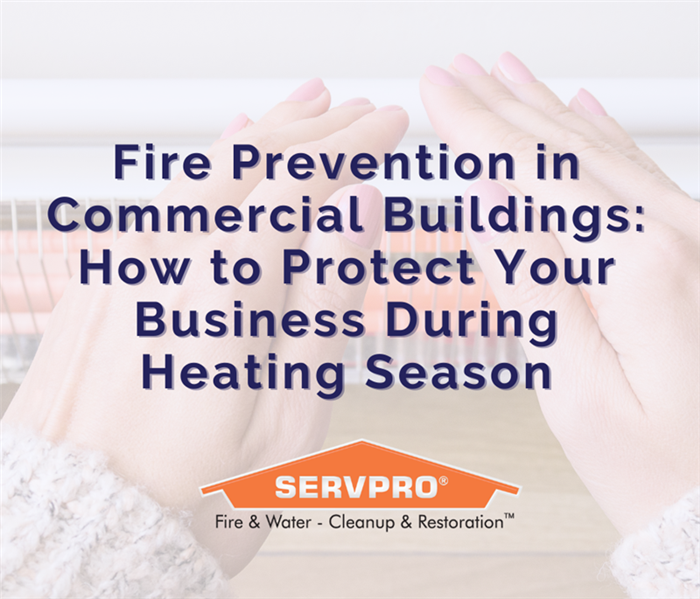Fire Prevention in Commercial Buildings: Safeguarding Your Business During Heating Season
11/6/2024 (Permalink)
 Here’s an overview of common fire risks during heating season and actionable tips to help safeguard your business.
Here’s an overview of common fire risks during heating season and actionable tips to help safeguard your business.
As temperatures drop and heating systems kick in, the risk of fire in commercial buildings rises. Heating equipment, space heaters, and electrical issues are common culprits of fires, especially in colder months. For business owners, proactive fire safety is essential to protect property and employees. Here’s an overview of common fire risks during heating season and actionable tips to help safeguard your business.
Common Fire Risks During Heating Season
Understanding fire hazards associated with heating systems can help you prepare effectively:
1. Heating Systems
While necessary for warmth, heating systems can be a fire hazard if not properly maintained. Malfunctioning furnaces, boilers, and heat pumps may overheat, leak gas, or cause electrical fires. Dust on heating elements and clogged vents also contribute to risks.
2. Space Heaters
Space heaters are a quick way to add warmth, especially in areas where central heating is inadequate. However, they account for a significant number of workplace fires annually. They can overheat, tip over, or ignite nearby materials like paper, curtains, or furniture.
3. Electrical Malfunctions
Electrical fires are also a concern during heating season, as heating appliances can strain a building’s electrical load. Faulty wiring, overloaded circuits, and damaged cords can all lead to sparks and fires. Older buildings are especially vulnerable if their electrical systems haven’t been updated to handle modern power demands.
4. Flammable Materials Near Heat Sources
Storing flammable items, like cleaning supplies or paper, too close to heating sources can quickly escalate a small spark into a major fire. Even furniture placed too close to a heater can ignite and spread fire.
Fire Prevention Tips for Business Owners
Preventing fires in your commercial property requires a blend of maintenance, awareness, and safety protocols. Here are key tips to minimize fire risks:
1. Schedule Regular Heating System Inspections
Ensure your heating system is inspected annually by a licensed HVAC professional. This not only improves efficiency but also reduces fire risks. Technicians can identify issues like gas leaks, faulty wiring, or clogged vents, preventing potential malfunctions.
- Clean Filters and Vents: Clogged filters can cause overheating. Regularly clean or replace filters to maintain airflow and reduce fire hazards.
- Test Smoke and Carbon Monoxide Detectors: Ensure detectors work properly, especially near heating equipment, for early warning of fires or gas leaks.
2. Set Space Heater Safety Guidelines
If space heaters are used in your building, establish clear safety rules to prevent accidents:
- Use Certified Heaters: Ensure all space heaters are certified by recognized labs (e.g., UL, ETL) and have safety features like automatic shut-off.
- Maintain Safe Distance: Place heaters at least three feet away from any flammable items, including paper, furniture, and curtains.
- Turn Off When Unattended: Heaters should be turned off when rooms are empty or at the end of the day. Heaters with timers can help prevent accidental overnight use.
- Use Proper Outlets: Avoid plugging heaters into power strips or extension cords, as they can overload circuits. Plug them directly into wall outlets.
3. Conduct Electrical Safety Checks
Heating season often strains electrical systems, so it’s essential to verify that your wiring can handle the load:
- Inspect Outlets and Cords: Check for frayed cords, loose outlets, or other signs of electrical wear and tear. Replace damaged cords immediately, and avoid running cords under carpets where they can be damaged.
- Monitor Electrical Load: Ensure circuits aren’t overloaded, especially when using heating equipment. An electrician can perform a load test to confirm your system’s capacity.
- Install Ground Fault Circuit Interrupters (GFCIs): GFCIs protect against electrical shocks and fires, especially in wet areas like kitchens. Ensure GFCIs are installed where needed.
4. Create a Fire-Safe Workspace
Maintain a fire-safe environment by following these practices:
- Clear Combustible Clutter: Keep flammable items away from heat sources, including cleaning chemicals, paper, and boxes.
- Designate a Smoking Area: If smoking is allowed, create an outdoor smoking area far from the building, with proper disposal containers for cigarettes.
- Ensure Fire Extinguishers Are Accessible: Place fire extinguishers in high-risk areas like kitchens and mechanical rooms, and train employees on their use.
5. Train Employees on Fire Safety
Regular fire safety training equips employees with the knowledge to prevent and respond to a fire. Topics to include are:
- How to Use a Fire Extinguisher: Train employees on the PASS method—Pull, Aim, Squeeze, and Sweep.
- Evacuation Procedures: Develop and communicate a clear evacuation plan, including exits and assembly points. Hold fire drills regularly.
- Reporting Hazards: Encourage employees to report hazards, like damaged cords or faulty heating equipment, to designated personnel.
Stay Prepared with Professional Assistance
By taking proactive steps—such as scheduling heating system inspections, establishing space heater guidelines, conducting electrical checks, and fostering a fire-safe environment—you can significantly lower fire risks for your business during heating season. Preparation, maintenance, and employee awareness are key to protecting your property and staff.
Our expert team is here to help with fire risk assessments, inspections, and preventive maintenance to keep your commercial property safe throughout winter. Contact us to learn how we can support your fire safety needs this season.
As a leader in restoration, Natick and Milford SERVPRO are equipped with advanced training and tools to restore your business quickly after fire incidents. Call us at (774) 290-4300 for immediate assistance.




 24/7 Emergency Service
24/7 Emergency Service